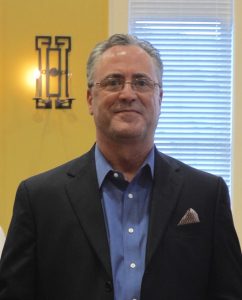July 12, 2017
Cliff Osbon is the president of Transcript Pharmacy, Inc., an independent specialty pharmacy provider in Flowood, Mississippi. He is also the newly-installed president of the Mississippi Pharmacists Association.
Osbon graduated from University of Louisiana-Monroe College of Pharmacy in 1984, and completed Purdue University’s post-graduate nuclear pharmacy program in 1993. Transcript Pharmacy has been named to Inc. Magazine’s list of fastest growing privately-owned companies for five years in a row.
Osbon drew from his experience as an independent pharmacy owner and entrepreneur to talk with the School of Pharmacy about the business of speciality pharmacy.
School of Pharmacy: Can you talk about your background?
Clifton Osbon: I was born and raised in Monroe, Louisiana. As a teenager, I had interests in both business and science. Our family pharmacists were a big influence in my life, and I saw pharmacy as a way to combine business, science and community service. I began the pre-pharmacy program at Northeast Louisiana University (now UL-Monroe) in 1979 and graduated from pharmacy school in 1984.
SOP: What was the idea behind Transcript Pharmacy?
CO: I knew that I wanted to create a pharmacy business that met needs in vulnerable patient populations, but didn’t know exactly what that would look like. In 2002, another pharmacist, Todd Barrett, and I decided to serve organ transplant recipients. We began to draft a business plan, secured permits, leased space, hired staff and opened in Flowood on January 2, 2003.
Our pharmacy business model is called a “specialty pharmacy” in the healthcare industry. We encounter confusion in our hometown area, where a local compounding pharmacy is called Specialty Pharmacy. It adds to the confusion that our company is located just across the street from their business!
SOP: How has the business changed over the years?
CO: Though we initially served only organ transplant recipients, in the fall of 2003, we began to market our patient care services to gastroenterology clinics that were treating Hepatitis C. In my previous consulting career, I had worked with patients who had Hepatitis C, and this seemed like a natural growth area for our business. Since that time, our regional sales managers have also aided us in reaching out to new practice specialties, including autoimmune diseases, oncology and other areas.
Our business had referral relationships with medical specialty practices in 15 to 20 states. The folks in those practices depend upon us to help them navigate the prior authorization process for specialty drugs they prescribe. These drugs often cost from $4,000 up to $30,000 per patient per month, so insurers and Pharmacy Benefit Managers, or PBMs, have stringent prior authorization processes.
These days, we are required to focus much of our attention on securing contracts with PBMs as a specialty pharmacy, securing and maintaining our dual accreditation and securing opportunities to dispense limited distribution specialty drugs that will not be available at every pharmacy.
SOP: What have you learned about the market since starting your business?
CO: It is incredibly complex! There are so many competitors. PBMs, some wholesalers, some pharmaceutical companies and some hospitals and clinics own their own specialty pharmacies. We have to offer excellent services to patients and health care providers to thrive. From our beginnings in 2002 up through today, we’ve become licensed in all 50 states and currently serve patients and clinics in about 20 states. So it seems that there are folks that value our level of patient care and our service!
Specialty pharmacies, the drugs we dispense and the patients we serve are all part of a complex system of patient care. In my career in specialty pharmacy, we offer enhanced patient support, coaching and education. It is a very fulfilling professional environment.
SOP: How did you become involved with Ole Miss Pharmacy?
CO: Both of my daughters attended Ole Miss. I have been on campus for tailgating and a football season ticket holder for the better part of a decade. I love everything about the town and the university!
By not being an alumnus, my involvement with the School of Pharmacy developed a little more slowly. I am currently on the Board of Visitors, a group of advisors to the school organized by Dean David D. Allen. It’s almost like coming full circle, because the pharmacists in Monroe who influenced me the most attended the Ole Miss School of Pharmacy back in the 1950s before Louisiana opened its pharmacy school.
SOP: What are your thoughts about the future of the specialty pharmacy business?
CO: Most of the new drugs being approved by the FDA are classified as specialty drugs and will be dispensed by specialty pharmacies like ours. This will continue to be a growth area within the pharmacy profession for decades to come. The entry of new competitors will create challenges, but the need for patient care will continue to provide growth opportunities for entrepreneurs who can meet the complex needs of patients.
